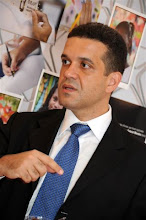- Back to Home »
- Brazilian Telecom Sector
 Brazil is the first one from the developing world, to initiate and maintain innovation capability especially in the switching equipment component of the telecommunications equipment industry (Mani, Sunil. 2004). The maintenance of this capability has come under some strain with the increasing external integration of the Brazilian telecommunications economy. Various components of this innovation system such as ANATEL - National Agency of Telecommunication, CPqD (telco industry R&D centre in Campinas, SP) and Embratel1 - Brazilian Telecommunications Company ) and especially the research and policy-making by Ministery of Communications and Ministery of Science and Technology parts to maintain this capability. The ensuing analysis shows that the innovation system is learning to cope with changes in its external environment like the Internet, mobile operator companies and even now with the digital television approaching. The country has not only managed to maintain its capability in the telecom sector, it has enhanced it in areas such as manufacturing and marketing, for which it did not have previous capacity.
Brazil is the first one from the developing world, to initiate and maintain innovation capability especially in the switching equipment component of the telecommunications equipment industry (Mani, Sunil. 2004). The maintenance of this capability has come under some strain with the increasing external integration of the Brazilian telecommunications economy. Various components of this innovation system such as ANATEL - National Agency of Telecommunication, CPqD (telco industry R&D centre in Campinas, SP) and Embratel1 - Brazilian Telecommunications Company ) and especially the research and policy-making by Ministery of Communications and Ministery of Science and Technology parts to maintain this capability. The ensuing analysis shows that the innovation system is learning to cope with changes in its external environment like the Internet, mobile operator companies and even now with the digital television approaching. The country has not only managed to maintain its capability in the telecom sector, it has enhanced it in areas such as manufacturing and marketing, for which it did not have previous capacity. Innovation capability in telecoms equipment in terms of the ability to conceptualize, design, and manufacture state-of-the-art telecommunications equipment,coupled with the ability to keep pace with important technological changes. This definition of innovation capability is operationalized in terms of an index of R&D. By taking three cases of telecoms technologies namely, (a) main automatic local exchanges; (b) a Wireless in Local Loop access technology; and (c) telecom software exports, it is demonstrated that the country has a growing innovation capability in this sector.
Innovation capability in telecoms equipment in terms of the ability to conceptualize, design, and manufacture state-of-the-art telecommunications equipment,coupled with the ability to keep pace with important technological changes. This definition of innovation capability is operationalized in terms of an index of R&D. By taking three cases of telecoms technologies namely, (a) main automatic local exchanges; (b) a Wireless in Local Loop access technology; and (c) telecom software exports, it is demonstrated that the country has a growing innovation capability in this sector.
With an early adopter attitude from the brazilian market such technologies transformed in products and services helped Brazil to be on the entry level of the telecom market with such international companies like Teléfonos de México2 (Embratel), Portugal Telecom3 and Telefónica Móviles4 (Vivo), América Móvil5 (Claro), Telecom Itália6 (TIM) and Tele Norte Leste7 (Oi) investing on intangible assets, intellectual capital and new business models in Brazil.
1 Embratel is a major Brazilian telecommunications company headquartered in Rio de Janeiro. The company was the long distance arm of Telebras until it was bought by the U.S. company MCI Communications for 2.65 billion reais during the 1998 break-up of Telebras. Since 2003, it is owned by Telmex (NYSE: TMX).
2 Teléfonos de México (NYSE: TMX), better known as Telmex, is a Mexican telecommunications company that provides telecommunication products and services in Mexico and in many parts of Latin America, such as Argentina, Brazil, Chile, Colombia, and Peru, and in North America to the United States. In addition to traditional fixed-line telephone service, Telmex also offers Internet access.
3 Portugal Telecom (Euronext: PTC, NYSE: PT) is the biggest telecom operator in Portugal. It operates mainly in Portugal and Brasil. It also has a very important presence in Morocco, Guinea-Bissau, Cape Verde, Mozambique, Timor-Leste, Angola, Kenya, China, and São Tomé and Príncipe.
4 Telefónica Móviles S.A. (NYSE: TEF, TYO: 9481 ) is a Spanish telecommunications company. Operating mainly in Spain and Latin America it is one of the largest fixed-line and mobile telecommunications companies in the world, 4th in terms of number of clients and 6th in total market value.
5 América Móvil AMX is a publicly traded wireless communications company that provides services to over 93.3 million wireless subscribers in Latin America as of December 31st 2005. The company has been a venture of Carlos Slim Helu. World headquarters is located in Mexico City, Mexico. It was ranked number 1 Information Technology company in 2005 by the Business Week magazine
6 Telecom Italia is an Italy-based telecommunications group engaged in the international information and communication technology sector. Telecom Italia's subsidiary companies Telecom Italia Media and Olivetti (the Telecom Italia Group), together with TIM S.p.A., which was merged into the Company on June 30, 2005, offer wireline and mobile communications, Internet, media and information technology solutions.
7 Tele Norte Leste holds the largest telephone company in Brazil, considering both lines in service and revenues. It is headquartered in Rio de Janeiro. Telemar was formed as Tele Norte Leste to merge sixteen state-owned incumbent local exchange carriers (ILECs), during the privatization of Brazilian telecommunications system.












